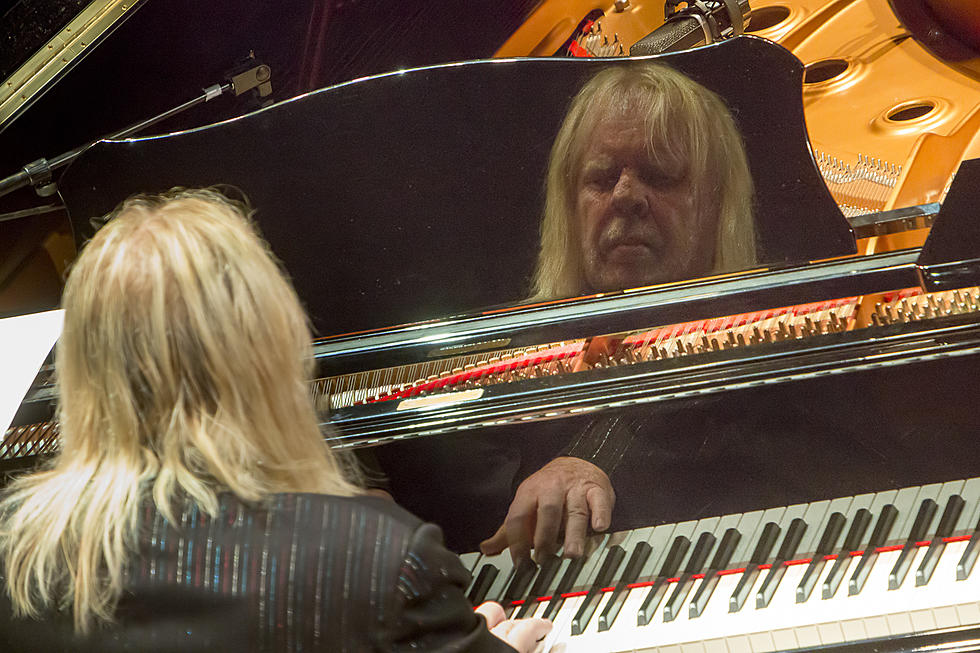
40 Years Ago: ‘Blake’s 7′ Kills Off All Its Stars … Or Does It?
The '70s British sci-fi TV show Blake’s 7 will be remembered by its naysayers for its horrifyingly low-budget sets and props. Those able to guide it along with the help of their own imagination, however, will remember if for the intensity of its lead characters and their gritty interpersonal relationships.
Created by Terry Nation – the writer behind Doctor Who’s Daleks – the show was designed to be the equivalent of The Dirty Dozen in space, following the adventures of Roj Blake (Gareth Thomas), a political activist working against the Federation dictatorship who is framed and put through a fake trial before being sentences to life on a penal colony. With the help of fellow prisoners Avon (Paul Darrow), Vila (Michael Keating), Jenna (Sally Knyvette) and Gan (David Jackson), Blake manages to escape and takes control of The Liberator, an alien ship left abandoned after a battle. Armed with the most powerful vehicle in the galaxy, and supported by its computer Zen, the supercomputer Orac (both voiced by Peter Tuddenham) and crew member Cally (Jan Chappell), Blake begins a strategic guerrilla war against the Federation, its leader Servalan (Jaqueline Pearce) and her henchman Travis (Stephen Grief, later played by Brian Croucher).
The show was launched in 1978, the year after Star Wars. The BBC team tasked with pulling it all together knew it couldn’t challenge George Lucas’ budget-busting epic, so Blake’s 7 was geared up to make the best of what it could, which was powerful writing and Shakespearian acting. And while the money was so tight that one spacecraft was clearly made from a hair dryer, and one alien was so unconvincing that the actors couldn’t stop laughing at it, there was the appealing image of The Liberator, which moved in the opposite direction its builders thought it would and needed constant repairs because the light bulb simulating its engine kept melting the green globe surrounding it.
From the start, the show pushed boundaries. It was one of the first to kill off a main character – Gan in Series Two – and it had no problem portraying a woman as leader of the galaxy. On top of that, the good-vs.-evil balance was never quite clear-cut. Set against Blake’s high morality was Avon’s selfishness and cunning, and Vila’s self-preservation and caution. When Thomas decided to leave at the end of Season Two, Darrow’s Avon became the leader no one could every fully trust. Blake’s 7 retained high viewing figures throughout its run – once, it’s said, beating British staple soap Coronation Street in the ratings – and when Servalan finally got hold of The Liberator at the end of Season Three (with the twist that she didn’t have it for long), the cast and crew felt they’d delivered a job well done and began to go about the rest of their lives.
Watch ‘Blake’s 7’ First-Episode Trailer
But it wasn’t over: BBC boss Bill Cotton watched the episode and enjoyed it so much that he placed a call to the studio. To everyone’s surprise, a continuity announcer told the viewers that Blake’s 7 would return for a fourth season. With the word given, but several gaps in the workforce to fill because people had found other jobs, producer Vere Lorimer took over and began to work up a suitable story arc and ending.
And what an ending. Despite his mistrust for Blake, Avon finds himself pursuing the missing leader through space, finally discovering him on a distant planet where he’s been trying to build a new rebellion. But Avon is led to believe that Blake is now working for the Federation, and, accusing him of betrayal (“Have you betrayed us? Have you betrayed me?”), he shoots him dead. That sets off a chain reaction during which Vila, replacement crew members Soolin (Glynis Barber), Tarrant (Steven Pacey) and Dayna (Josette Simon) are all shot. The final scene zooms in on Avon, surrounded by Federation troopers as an intruder alarm continues to sound. He smiles as the scene fades to black and a series of shots rings out.
By the time episode 13 – titled simply "Blake" – aired on Dec. 21, 1981, the BBC was in turmoil, accused by Margaret Thatcher’s powerful British government of political bias. Cotton had been promoted, and his replacement (who’d soon be forced to resign) didn’t call for Blake’s 7 to continue. Fans realized that Blake was definitely dead (Thomas had added extra theatrical blood packs to his costume to make sure he could never be asked to return again), but we couldn’t be certain the others were.
“I wanted to set up the biggest cliffhanger that’s ever been,” Lorimer told the BBC soon afterward. “The public has … lived with these characters, loved them, and suddenly seeing them apparently killed – apparently – has given them such a shock that the demand for its return has been tremendous. ... Well, they weren’t killed at all, really. I decided that Blake would die – he has to die, and he did – and was very clearly seen to. However, of the other five, if you watched it, you would see that there was no blood on them. They fell in a dreamlike way. You never saw Avon killed. What happened to Servalan? Where is Orac? They are still living, aren’t they? I don’t know, but they could well be.”
In response to fan letters protesting against the dramatic close, Lorimer said, “It certainly was an unusual and unexpected end, and I was criticized for the fact that there did seem to be a lot of violence … but in point of fact it really was not very violent. What it was was so unexpected. The public had been expecting a typical ending when our heroes once again beat the forces of evil and flew off into the stars, into another episode. … In the space of about two minutes it looked as though all the heroes bit the dust. It was such a shock, but in point of fact it was not very violent at all.”
In 1991 Thomas said the team hadn’t expected Blake’s 7 to “live on as much as it has,” although he noted, “But yes, we thought it was going to be a cult program – because any science fiction is! It was a totally new concept at the time, and it just took off.” Asked why it had been canceled, he replied: “We don’t know, but one of the obvious reasons was you had two protagonists – Blake and Servalan – and there’s a limit to how far you can go without one of them winning.” He also accepted that his attempt to be killed off for good didn't persuade the show’s followers: “I was informed by a fan that in episode something, there was a clone, so perhaps it was a clone that got killed.”
In 1980 Darrow observed that "this is where Blake’s 7 was probably successful, and this is perhaps why the characters are as popular as they seem to be. … The emphasis on character – whether it came from the writers or the actors themselves – was such that it created a deeper interest. People care about the characters, and that’s important.” He recalled that a new level of morality was added to Avon’s character to reinforce his position as leader after Blake had gone missing. “And I thought, Well, if they introduce a streak of morality in him, I can play it in such a way that he looks as though he’s amoral. So I left it at that. An actor can do all sorts of things. You can say the phrase ‘I love you’ in 9,000 different ways. What was good about the series was that there was a marvelous balance between everybody, and we all got on well.”
In 2014 he noted that the "budget was the equivalent as a coffee break for Star Trek, the scripts generally speaking were good … but the chemistry between the actors worked either by luck or by judgment. The casting was pretty much bang on. ... At conventions in America when I’ve met a lot of actors, [Star Trek star] George Takei said to me, ‘Blake’s 7 scripts are so good. That’s why it did well, even though it couldn’t compete against Star Trek for production values.’”
Darrow was involved in an attempted reboot in the ’00s, based on the idea that Avon, for one, survived and is rescued by a new generation of rebels. He eventually left the project over creative differences, and later producers Big Finish brought the show back for new episodes. But the original four-season TV show remained abandoned with its giant cliffhanger – which is perhaps another reason it’s so well-remembered.
“One of the great, great secrets of the success of the show has been its unpredictability,” Lorimer said. “One minute it was very amusing, one minute it was rather horrific, another minute it was very exciting, at other times human. Every aspect of storytelling has been told in this series. … It has provided a wonderful escapism, and it’s not a pointless operation to provide people with wonderful escapism. I would like to have it back, of course, but it’s a managerial decision. … I think sometimes managers are right to take a show off at its zenith so that you leave the characters moving into legend. In everybody’s mind they’re still fighting the good fight out among the stars.”
28 Classic Films That Were Turned Into (Mostly Failed) TV Shows
More From Classic Rock Q107










